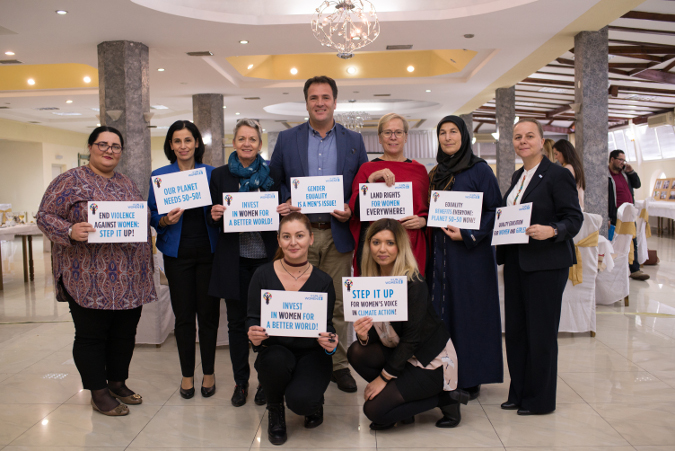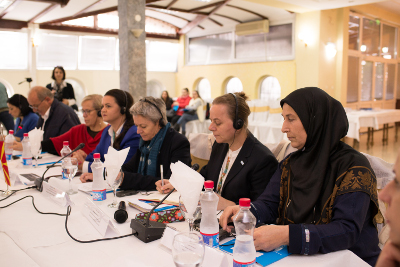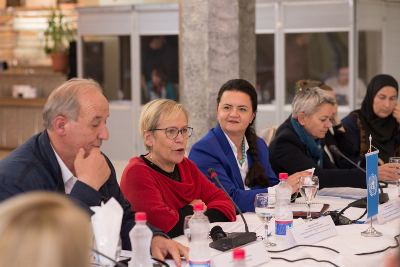Gender-responsive budgeting's successes and challenges reviewed
To mark Int’l Day of Rural Women, participants at a UN Women roundtable in FYR Macedonia discuss the positive impacts of local level gender-responsive budgeting and gender equality measures.Date:

Gender-responsive budgeting has strengthened women’s entrepreneurship, improved rural-urban bus connections and brought participation of women and men in creating local budgets and policies in municipalities participating in a UN Women gender-responsive budgeting project in the former Yugoslav Republic of (fYR) Macedonia, said panelists at a recent roundtable.
Organized by UN Women and the Municipality of Bogovinje to mark the International Day of Rural Women, the event brought together 50 representatives from government, local municipalities, civil society and international groups. Participants discussed how municipalities established local level standards for gender equality and budgets, and shared best practices in implementing gender-responsive budgeting and gender-sensitive policies.
Bogovinje, which hosted the roundtable, is a small town of 29,000 people. It is one of 10 pilot municipalities in fYR Macedonia to take part in the UN Women Regional Programme Promoting Gender Responsive Policies in South East Europe, supported by the Swiss Agency for Development and Cooperation and the Austrian Development Corporation.

The project in FYR Macedonia, one of four countries included in the UN Women regional project, focuses on advancing government efforts to institutionalize gender-responsive budgeting at central level and piloting it at local levels.
Gender-responsive budgeting (GRB) addresses gender bias and discrimination by analyzing government budgets to ensure that national commitments to gender equality and women’s empowerment are adequately funded.
The UN Women Office in Skopje has been working closely with Bogovinje to apply gender-responsive budgeting, strengthen its municipal administration to meet gender-related commitments, and improve its collection of gender disaggregated data. Two years ago, Bogovinje began actively supporting and promoting small scale women’s businesses.
The Mayor of Bogovinje, Mr Hazbi Idrizi, opened the event and stressed how important empowering rural women was for community prosperity. The Minister of Labour and Social Policy, Ms Frosina Tashevska-Remenski, noted that more work is needed at the central level to strengthen GRB and overcome challenges: “The GRB proved a very useful tool, so we plan an evaluation of the GRB strategy to determinate next steps and goals and review the implementation challenges faced by participating municipalities.”

UN Women Regional Director for Europe and Central Asia, Ms Ingibjorg Gisladottir, said: “Eliminating discrimination that prevents rural women from realizing their full potential is crucial to end poverty and promote development.” She added that UN Women will continue to support activities that ensure budgets and projects reflect the needs of rural women and men.
H.E. Sybille Suter Tejada, Swiss Ambassador in the country, emphasized that the Swiss Agency for Development is committed to equitable governance, equal rights and conditions for women and men, boys and girls. She also stressed the significance of the budget as the most important policy tool for measuring how much government policies are gender sensitive.
Participants discussed examples of women’s entrepreneurship and how they can have a positive impact on the whole community. Ms Rabije Sinani, a local businesswoman from Bogovinje, shared her experience in starting her own catering and cake production enterprise, stressing the importance of including rural women in the labour market.
Other participants cited positive change models including a frequent bus line connecting urban-rural areas in Bitola Municipality and Skopje’s use of public participation in creating local policies and budgets.